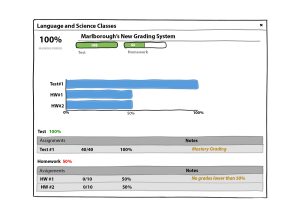
“Because we were in crisis mode, our thinking behind that was more around trying to give people mental space during that time when everything was critical and new, and so rather than creating more stress, we tried to take the grade stress away,” Fitts said.
However, because this school year has started online, there are no in-person grades to compare online grades with. Yet Marlborough’s mission for equity in terms of grading remains. Associate Head of Academics and Director of Upper School Dr. Laura Hotchkiss and the Assessment Committee have worked together to make grading more equitable with the help of “Grading for Equity,” a book by Joe Feldman.
The first change being implemented is that 50% is now the lowest grade a student can earn on any assignment, with zero -59% being an F, and 60-100% being a passing grade. This enables the creation of equal grade increments, and means that students no longer have to try to bounce back from a zero in their grade book, according to Assessment Committee Co-Chair Melissa Morlock.
“When you look mathematically at a traditional grading scale… you find that you have a 59% possibility to fail, and that’s not balanced in terms of being able to demonstrate what you understand what you don’t understand,” Morlock said.
In addition to a new grading scale, students can no longer be penalized for submitting work late. As long as the student has communicated with the teacher, no class can deduct points for submitting an assignment past its due date. The assignment will instead be marked as late or incomplete in the grade book. According to Hotchkiss, this new policy was not created to encourage students to do their work late and procrastinate, but rather to encourage communication with teachers and grading based on performance.
Furthermore, more teachers are using mastery-based learning, which focuses on retaking assessments and building understanding that based on skill by providing the ability to re-assess individual skills. Morlock initially brought this idea to Marlbrorough four years ago for Chemistry classes, and it has now spread to the World Language Department and several other individual classes. Morlock describes mastery-based learning as placing an emphasis on motivating students to really learn the concepts and focus more on cumulative learning.
“A test measures your performance on one day in class, and we want to look at your growth as a learner over a longer period of time,” Morlock said.






